Spend enough time around Capitol Hill and you’ll inevitably hear phrases like “Worse than Watergate,” or worse yet, “The Ukraine.” But, while the American people are being forced to watch the underwhelming, direct-to-DVD sequel of Watergate, some companies are taking advantage of the distraction to craft legislation that would be a boon to their bottom lines – and a disaster for everybody else, especially taxpayers.
In particular, struggling mega-corporation Boeing is stealthily trying to use the National Aeronautics and Space Administration (NASA) as its own personal piggy-bank while leaving taxpayers in the lurch by getting lawmakers to craft legislation giving Boeing an unfair advantage in future missions. Americans deserve a functional government that focuses on the future and keeps cronyism at bay. But as long as Congress embraces its low-budget storylines while giving high budgets to favored companies, everyone will lose out.
The current goal, dubbed the “Artemis Program,” is to get humans back to the Moon by 2024 and use a newly-constructed lunar outpost as a launching point for a Mars expedition. The Moon phase alone will likely cost taxpayers more than $50 billion. Administration and NASA leadership have indicated that there will be some competitive outsourcing to private space companies. The agency wants companies to compete for taxpayer dollars, asking aerospace businesses such as Blue Origin, Boeing, Lockheed Martin, Northrop Grumman, and SpaceX to design lunar landers capable of getting astronauts back to the Moon.
The hope expressed by officials such as NASA Administrator Jim Bridenstine is that, even if America’s next generation space race is expensive, at least some good ol’ fashioned bidding wars can ease up costs for taxpayers. But, relying on markets and competition doesn’t suit Boeing, which has so far failed to produce practical, cost-effective spaceships and capsules. The company is still licking its wounds after trying and failing to dock its Starliner capsule onto the International Space Station (ISS). And the old adage “you get what you pay for” doesn’t work here because Starliner’s $90 million price-tag for transporting each astronaut to the ISS is more than 60 percent higher than what SpaceX will be charging for their rival Crew Dragon ship.
Recommended
Boeing’s pricing and quality problems don’t bode well for its chances to develop a cost-competitive lunar lander. This brings to mind another adage: “when you can’t beat ‘em, write laws to rig the process.” An authorization act for NASA currently being considered in the U.S. House of Representatives does just that, “refining” the space agency’s plans to knee-cap competition and make Boeing the only game in town. Interestingly, the bill calls for “an integrated lunar landing system carried on an Exploration Upper Stage-enhanced Space Launch System for the human lunar landing missions.” In plain English, lawmakers are trying to micromanage the Moon landing process and ensure that the journey to and from the lunar surface is undertaken with just one rocket launch.
And curiously enough, Boeing is the only company to have submitted a proposal that would have an “integrated lunar landing system” taking astronauts to and from the Moon…with a single rocket launch. It could, of course, be cheaper to go with the a la carte approach of multiple rocket launches instead of the all-inclusive lander package. But Boeing doesn’t care to have NASA – or taxpayers – find out which approach is the cheapest. Boeing would much rather take advantage of the excitement and intrigue enveloping Capitol Hill to quietly pass their preferred legislation. And, this cronyism will almost certainly be ignored, even though it’s far more alarming than anything happening in “The Ukraine.” Some things, it turns out, are actually “Worse than Watergate.”
Ross Marchand is the director of policy for the Taxpayers Protection Alliance.
























Join the conversation as a VIP Member